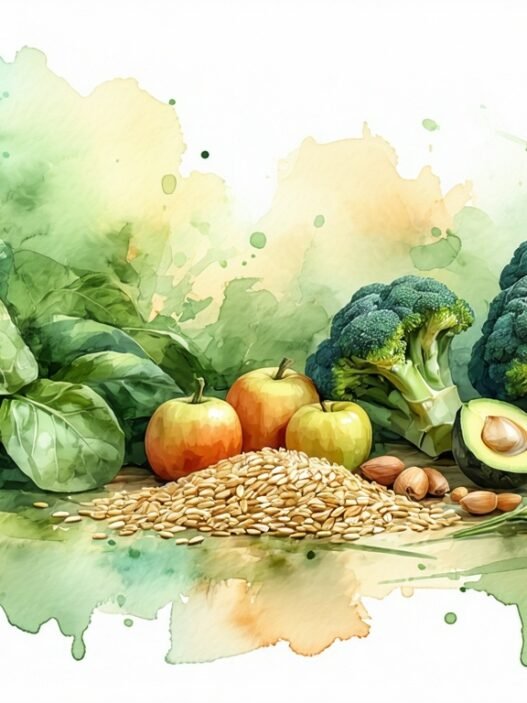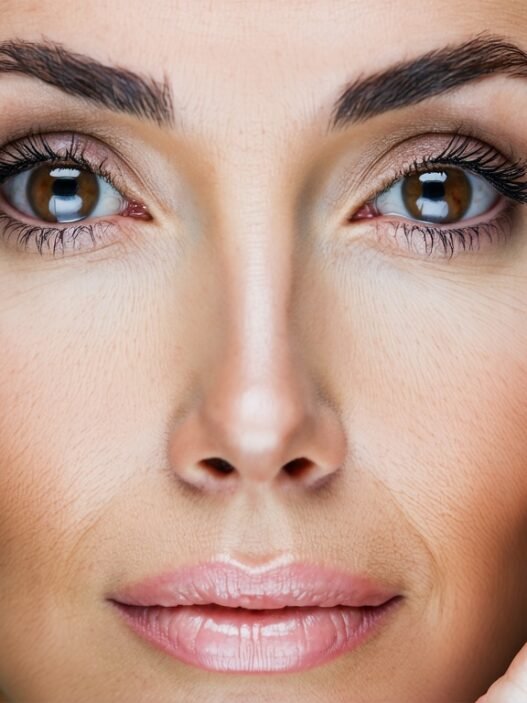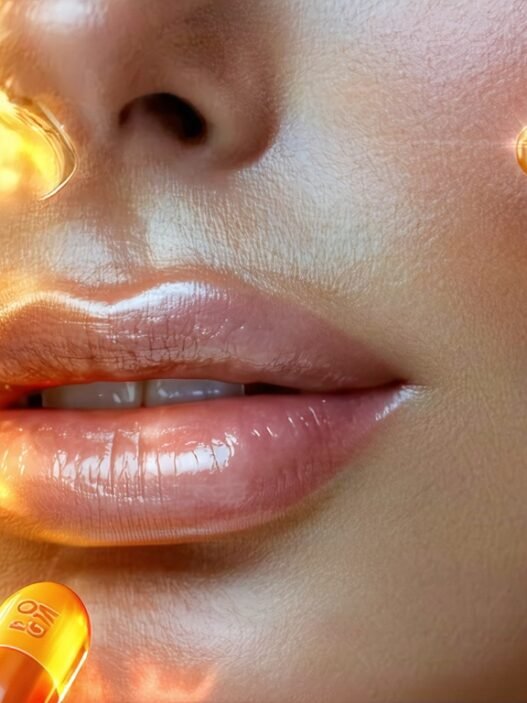Understanding CoQ10
Coenzyme Q10 (CoQ10) plays a crucial role in skin regeneration and vitality. In this section, we’ll explore its role in aging and the importance of maintaining healthy CoQ10 levels.
Role in Aging
CoQ10 functions as an essential antioxidant and contributes significantly to cellular energy metabolism by neutralizing reactive species and other free radicals. This process is vital in combating both intrinsic and extrinsic aging. Intrinsic aging refers to the natural aging process influenced by genetics, whereas extrinsic aging results from environmental factors like UV radiation and pollution.
As individuals age, the levels of CoQ10 in the skin naturally decline. This reduction in CoQ10 levels is associated with various signs of aging, including the appearance of wrinkles, loss of skin elasticity, and decreased skin hydration Nature). Furthermore, exposure to UV radiation accelerates the depletion of CoQ10, emphasizing the need for its external supplementation (J Clin Aesthet Dermatol).
Importance of CoQ10 Levels
Maintaining optimal CoQ10 levels is essential for promoting skin health and delaying the signs of aging. CoQ10’s ability to penetrate the skin effectively makes it a valuable ingredient in topical skincare formulations. Topical application enhances the proliferation of fibroblasts, increases mRNA expression of collagen and elastin, and improves the antioxidant status of skin cells (J Clin Aesthet Dermatol).
| Benefit of Optimal CoQ10 Levels | Description |
|---|---|
| Antioxidant Action | Neutralizes free radicals and decreases oxidative stress. |
| Collagen & Elastin Synthesis | Boosts collagen and elastin production, contributing to skin firmness. |
| Cellular Energy | Enhances cellular energy metabolism, reducing signs of fatigue in the skin. |
| Skin Barrier Function | Improves skin’s ability to retain moisture and stay hydrated. |
For adults aged 35–65 concerned with aging and vitality, incorporating CoQ10 into their skincare routine can be highly beneficial. It offers dual functionality as an energy booster and powerful antioxidant, making it ideal for combating signs of aging. For more detailed information on CoQ10 benefits for skin, including how it improves skin elasticity and fights free radicals, visit our comprehensive guide.
Maintaining CoQ10 levels is also crucial for overall cellular health. CoQ10 supplementation has been shown to improve cellular oxidative status and reverse the effects of CoQ10 depletion, which can lead to cellular senescence. To explore the best ways to supplement CoQ10, check out our article on best CoQ10 supplements.
By understanding the importance of CoQ10 levels, individuals can make informed decisions about their skincare and overall health, ensuring they maintain a youthful, vibrant appearance well into their later years. For more information on how CoQ10 can enhance your skincare routine, visit our section on CoQ10 skin care products.
Dietary Sources and Supplements
Getting CoQ10 from various dietary sources and supplements is essential for maintaining optimal levels in the body. Here, we explore the available food sources of CoQ10 and provide an overview of the supplement options.
Food Sources of CoQ10
CoQ10 is naturally present in certain foods, but the amounts found in these dietary sources may not be sufficient to significantly raise CoQ10 levels in the body. Here are some common food sources of CoQ10:
| Food Source | CoQ10 Content (mg per 3 oz) |
|---|---|
| Beef | 3.06 |
| Chicken | 1.4 – 2.1 |
| Pork | 1.18 – 2.23 |
| Fatty Fish (e.g., salmon, tuna) | 0.85 – 1.52 |
| Soybeans | 1.2 |
| Peanuts | 2.6 |
| Spinach | 1.9 |
| Broccoli | 0.6 |
Data from Mayo Clinic.
Despite the availability of CoQ10 in these foods, individuals may still need to rely on supplements to achieve the beneficial levels required for significant health improvements related to coq10 and skin regeneration.
CoQ10 Supplements Overview
CoQ10 supplements provide a more potent and concentrated source of CoQ10 compared to dietary intake alone. These supplements come in various forms such as capsules, chewable tablets, and liquid syrups. The effectiveness of CoQ10 supplements in supporting skin health and regeneration is well-documented.
Benefits of CoQ10 supplements include:
- Supporting cardiovascular health by improving heart function and reducing oxidative stress (Mayo Clinic)
- Reducing the frequency and severity of migraines (Mayo Clinic)
- Enhancing glucose metabolism and managing diabetes (Healthline)
- Potential reduction in the risk of certain cancers and neurodegenerative diseases (Healthline)
It’s essential to take CoQ10 supplements under a doctor’s supervision to avoid any possible side effects and to ensure it’s safe according to one’s health status.
For more information on CoQ10 and its benefits, visit our articles on best coq10 supplements and coq10 benefits for skin. To explore more about the natural sources, check our guide on natural sources of coq10.
Health Benefits of CoQ10
Coenzyme Q10 (CoQ10) offers a multitude of health benefits. This section delves into how CoQ10 supports cardiovascular health, migraine treatment, and aids in managing lung and diabetes conditions.
Cardiovascular Health
CoQ10 is essential for heart health. As an antioxidant, it assists in maintaining optimal energy levels in heart cells and protects against oxidative damage. According to the Mayo Clinic, CoQ10 supplements may help prevent or treat certain heart conditions, such as heart failure and high blood pressure. They can also improve symptoms and reduce the likelihood of future heart-related events.
| Health Condition | Beneficial Effects of CoQ10 |
|---|---|
| Heart Failure | Symptom improvement, reduced hospitalizations |
| High Blood Pressure | Blood pressure regulation |
For additional information, visit our article on coq10 and heart health.
Migraine Treatment
Research suggests that CoQ10 can be effective in reducing the severity, duration, and frequency of migraine episodes. A study cited by Healthline indicates that adults who consumed CoQ10 experienced fewer migraines compared to those who took a placebo.
| Treatment Aspect | Impact of CoQ10 |
|---|---|
| Severity of Migraines | Reduction |
| Duration of Migraines | Reduction |
| Frequency of Episodes | Reduction |
Explore more about supplements for migraine treatment.
Lung and Diabetes Benefits
CoQ10 is beneficial for lung health. Research indicates that individuals with lung diseases like chronic obstructive pulmonary disease (COPD) and asthma exhibit higher levels of oxidized CoQ10 in their lungs, which suggests increased oxidative stress (Healthline). By neutralizing oxidative stress, CoQ10 helps in managing and possibly improving lung functions.
Regarding diabetes management, CoQ10 has been shown to improve insulin sensitivity, regulate blood sugar levels, and reduce markers of oxidative stress. These benefits make CoQ10 a promising supplement for individuals managing diabetes.
| Health Condition | Beneficial Effects of CoQ10 |
|---|---|
| Chronic Lung Diseases | Reduction in oxidative stress |
| Diabetes | Improved insulin sensitivity, better blood sugar control |
For more information on CoQ10 benefits for diabetics, visit our article on natural sources of CoQ10.
Understanding the various health benefits of CoQ10 broadens its appeal beyond skin regeneration. For detailed insights on applying it to skincare, check out coq10 benefits for skin and coq10 and skin regeneration.
CoQ10 for Skin Regeneration
Coenzyme Q10 (CoQ10) has been recognized for its significant role in skin regeneration, particularly in protecting skin from UV damage, reducing wrinkles, and offering topical application benefits. This section explores how CoQ10 helps maintain vitality and youthfulness in the skin.
Protection Against UV Damage
CoQ10 supports skin health as it ages by reducing oxidative damage caused by UV rays. This essential compound diminishes with age and under external stress factors, leading to signs of aging. It acts as an antioxidant, battling oxidative stress which is a key contributor to premature aging (Healthline).
| Factor | Normal Function | Under Oxidative Stress |
|---|---|---|
| CoQ10 Levels | High | Low |
| Oxidative Damage | Low | High |
| Skin Vitality | High | Low |
To combat UV damage, CoQ10-enriched skincare products can replenish natural CoQ10 levels in the skin. For insights on the best form and dosage to protect your skin, see our guide on coq10 dosage for anti-aging.
Reduction of Wrinkles
CoQ10 is effective in reducing the depth of wrinkles, thus contributing to a more youthful appearance. When applied topically, CoQ10-containing formulas can replenish ubiquinone levels in the epidermis. This results in the conversion of ubiquinone to ubiquinol, a variant with significant antioxidant properties (PubMed Central).
According to Nivea UK, Coenzyme Q10 plays a crucial role in the synthesis of Collagen and Elastin, essential proteins for maintaining the skin’s structure and elasticity. By enhancing Collagen and Elastin production, CoQ10 supports skin firmness and its ability to stretch and regain shape, promoting healthier and more youthful-looking skin.
For more insights on how CoQ10 interacts with skin aging, explore our resource on coq10 and skin aging.
Topical Application Benefits
In skincare products, CoQ10 is used topically to support cellular energy production, act as an antioxidant, and promote collagen and elastin production (Nivea UK). This makes it a valuable ingredient in various anti-aging and skin-rejuvenating products.
| Benefit | Impact on Skin |
|---|---|
| Collagen & Elastin Synthesis | Improves firmness and elasticity |
| Antioxidant Properties | Reduces oxidative stress |
| Cellular Energy Production | Enhances cell function |
Topical treatment with Q10-containing formulas has shown significant benefits, including skin hydration, wrinkle reduction, and enhanced skin renewal. For more details on specific product applications, visit our comprehensive guide on coq10 skin care products.
CoQ10 provides essential support for skin regeneration, safeguarding against UV damage, reducing wrinkles, and offering significant benefits when applied topically. To further explore the advantages of using CoQ10 in your skincare routine, check out our article on coq10 for skin repair.
Clinical Studies on CoQ10
Effects on Skin Aging
CoQ10, or Coenzyme Q10, has demonstrated significant effects on skin aging in various clinical studies. One study published in PubMed Central found that topical CoQ10 formulas effectively increased quinone levels on the skin’s surface and deeper layers of the epidermis. This finding underscores CoQ10’s ability to penetrate the skin and provide antioxidant benefits.
Another study reported in the Journal of Clinical and Aesthetic Dermatology showed that regular application of CoQ10 skincare products can reduce the appearance of wrinkles, increase skin elasticity, and improve hydration levels. These benefits point towards CoQ10’s potential as a powerful anti-aging ingredient.
| Study | Findings |
|---|---|
| PubMed Central | Increased quinone levels in epidermis |
| Journal of Clinical and Aesthetic Dermatology | Reduced wrinkles, increased elasticity, improved hydration |
Benefits on Skin Health
The benefits of CoQ10 for skin health extend beyond its anti-aging effects. Clinical research has shown that CoQ10 can help protect the skin from oxidative damage caused by UV rays, one of the primary contributors to premature aging. According to Healthline, CoQ10’s antioxidant properties reduce oxidative stress and promote healthier, more youthful-looking skin.
Further studies have revealed that CoQ10 enhances the activity of fibroblasts, which are essential for collagen and elastin production. By increasing mRNA expression of these crucial proteins, CoQ10 supports the structural integrity and elasticity of the skin. This helps maintain a firm and smooth complexion.
For more information on the benefits of CoQ10 for skin health, visit our detailed coq10 and skin health article.
Cellular Mechanisms
CoQ10 operates at the cellular level to promote skin vitality and regeneration. Studies have shown that CoQ10 stabilizes and protects mitochondrial function against UV irradiation, a major source of cellular damage and aging. By safeguarding the mitochondria, CoQ10 ensures that cells remain energetic and perform optimally.
Furthermore, CoQ10’s role in mitigating oxidative damage is pivotal in maintaining cellular health. By neutralizing free radicals, CoQ10 minimizes the risk of cellular breakdown and aging.
The broad range of cellular mechanisms influenced by CoQ10 highlights its importance in skin care and anti-aging regimens. To explore more about how CoQ10 contributes to cellular health, check out our detailed guide on coq10 and mitochondrial function and its antioxidant benefits.
CoQ10’s proven benefits in skin aging, overall skin health, and cellular mechanisms make it an essential component of any effective anti-aging skincare routine. By understanding these clinical insights, adults concerned with aging can make informed decisions about incorporating CoQ10 into their regimen. For product recommendations, visit our page on coq10 skin care products.
Using CoQ10 in Skincare
CoQ10, also known as Coenzyme Q10, plays a crucial role in skin regeneration and vitality. This section explores how CoQ10 benefits skincare, including its antioxidant properties, its role in collagen and elastin synthesis, and its application in various skincare products.
Antioxidant Properties
CoQ10 functions as a powerful antioxidant, protecting the skin from oxidative stress caused by free radicals. As we age, the levels of CoQ10 in our skin decrease, leading to visible signs of aging like wrinkles and fine lines. Topically applied CoQ10 can replenish these levels, stabilizing mitochondrial activity and promoting skin regeneration processes. This antioxidant action is essential for maintaining youthful and healthy-looking skin. To further understand these benefits, you can explore our detailed article on coq10 antioxidant benefits.
Collagen and Elastin Synthesis
CoQ10 also aids in the synthesis of collagen and elastin, vital proteins that maintain the skin’s structure and elasticity. These proteins support skin firmness and its ability to stretch and regain shape, promoting healthier and more youthful-looking skin.
Scientific studies indicate that CoQ10 application enhances the proliferation of fibroblasts, increases mRNA expression of collagen and elastin, and improves the antioxidant status in skin cells. This evidence highlights CoQ10’s significant role in combating skin aging and enhancing skin vitality.
Product Applications
CoQ10 is a valuable ingredient in various anti-aging and skin-rejuvenating products. Topical formulations containing CoQ10 not only replenish ubiquinone levels in the epidermis but also convert it to ubiquinol, a variant with antioxidant properties (PubMed Central). These products support cellular energy production, act as antioxidants, and promote collagen and elastin production.
For those interested in trying CoQ10 skincare products, we recommend reading our detailed guide on coq10 skin care products, which offers insights into the best products available.
| Benefit | Mechanism | Internal Link |
|---|---|---|
| Antioxidant Properties | Protects skin from oxidative stress | coq10 antioxidant benefits |
| Collagen Synthesis | Enhances collagen production for skin firmness | coq10 and collagen production |
| Elastin Synthesis | Increases elastin production for skin elasticity | coq10 and skin elasticity |
Using CoQ10 in skincare offers numerous benefits, from antioxidant protection to collagen and elastin synthesis. By incorporating this powerhouse ingredient into your routine, you can promote a youthful and vibrant complexion. For tips on how to effectively use CoQ10 in your skincare regimen, visit our comprehensive guide on coq10 for anti-aging skincare.




















